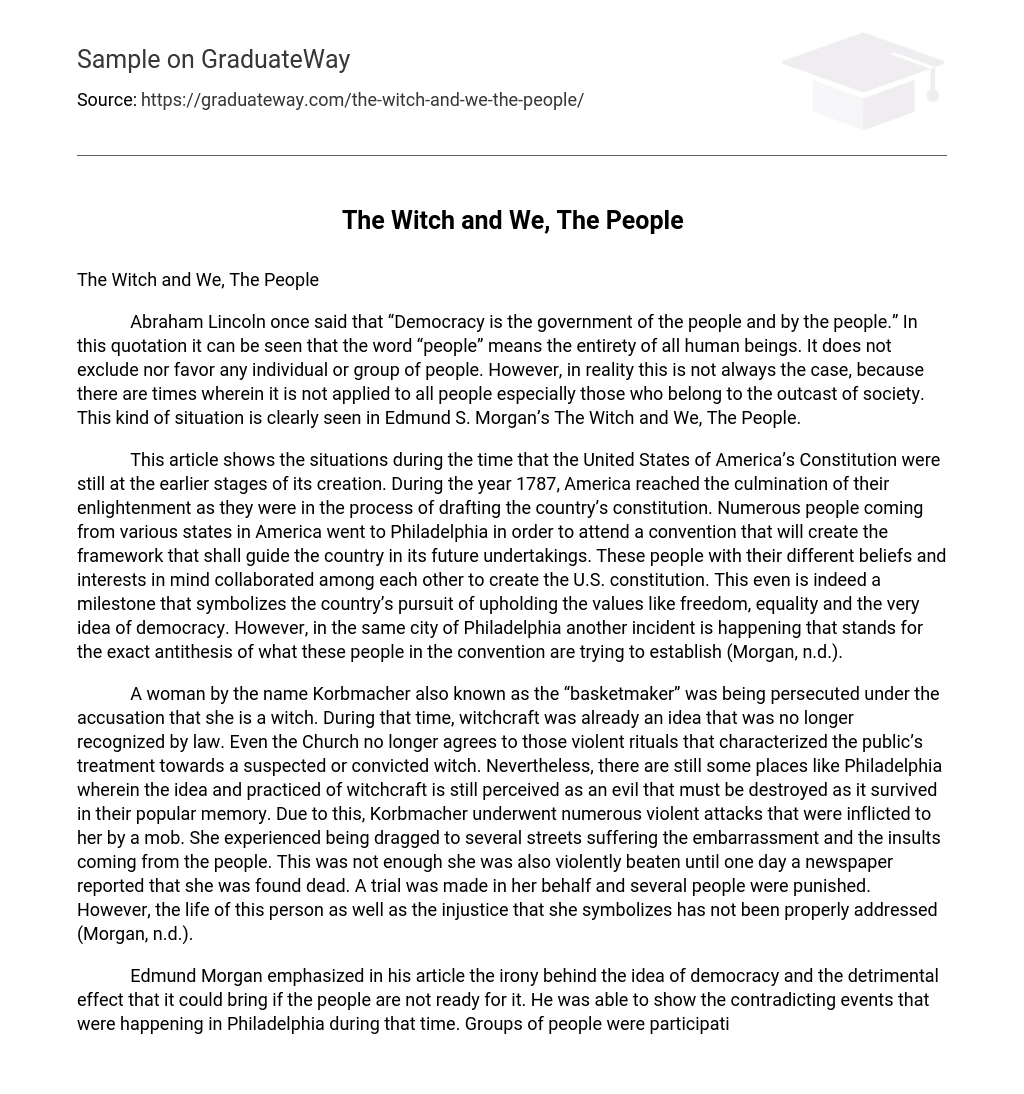Abraham Lincoln once said that “Democracy is the government of the people and by the people.” In this quotation it can be seen that the word “people” means the entirety of all human beings. It does not exclude nor favor any individual or group of people. However, in reality this is not always the case, because there are times wherein it is not applied to all people especially those who belong to the outcast of society. This kind of situation is clearly seen in Edmund S. Morgan’s The Witch and We, The People.
This article shows the situations during the time that the United States of America’s Constitution were still at the earlier stages of its creation. During the year 1787, America reached the culmination of their enlightenment as they were in the process of drafting the country’s constitution. Numerous people coming from various states in America went to Philadelphia in order to attend a convention that will create the framework that shall guide the country in its future undertakings. These people with their different beliefs and interests in mind collaborated among each other to create the U.S. constitution. This even is indeed a milestone that symbolizes the country’s pursuit of upholding the values like freedom, equality and the very idea of democracy. However, in the same city of Philadelphia another incident is happening that stands for the exact antithesis of what these people in the convention are trying to establish (Morgan, n.d.).
A woman by the name Korbmacher also known as the “basketmaker” was being persecuted under the accusation that she is a witch. During that time, witchcraft was already an idea that was no longer recognized by law. Even the Church no longer agrees to those violent rituals that characterized the public’s treatment towards a suspected or convicted witch. Nevertheless, there are still some places like Philadelphia wherein the idea and practiced of witchcraft is still perceived as an evil that must be destroyed as it survived in their popular memory. Due to this, Korbmacher underwent numerous violent attacks that were inflicted to her by a mob. She experienced being dragged to several streets suffering the embarrassment and the insults coming from the people. This was not enough she was also violently beaten until one day a newspaper reported that she was found dead. A trial was made in her behalf and several people were punished. However, the life of this person as well as the injustice that she symbolizes has not been properly addressed (Morgan, n.d.).
Edmund Morgan emphasized in his article the irony behind the idea of democracy and the detrimental effect that it could bring if the people are not ready for it. He was able to show the contradicting events that were happening in Philadelphia during that time. Groups of people were participating in a Constitutional Convention, thinking of ways to ensued democracy on the country. On the other hand, a certain part of the same city is actually doing violent actions that are the exact opposite of the ideals the people in the convention are negotiating about. Morgan highlighted the antithesis of democracy through the savageness of the people toward the woman accused of being a witch. He argues that enlightenment has not reached its culmination in the drafting of the constitution because it has still a long way to go.
Morgan’s article enabled me to see democracy in a different light. I was able to reassess the democracy and its real effect towards the people. Democracy is an effective means by which the general will of the people would be implemented. However, due consideration and importance is not given to those that are not included in the majority. This is proven in the case of the accused witch because the maltreatment that she suffered was not properly attended to. Even the newspapers would simply refer to her as the “woman” without even bothering to know her name. This only shows that she is not given importance as this kind of news is nothing as compared with the Constitutional Convention that was happening. Nevertheless, this exact incident should have served as a warning to drafters of the constitution in order for them to analyze if “excess freedom,” as the author pertains to it, is really good for the people. Morgan made me think if people are indeed enlightened and competent enough to handle the freedom that democracy entails.
Reference
Morgan, E. S. “The Witch and We, The People.





